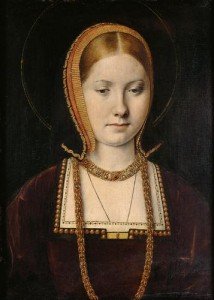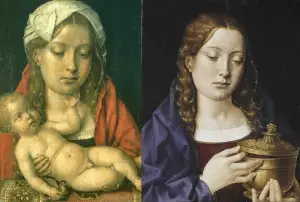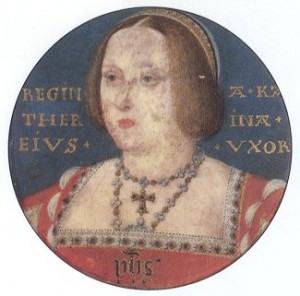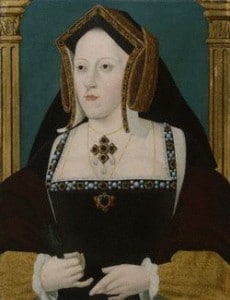
I thought that I would write about the six wives and the various stereotypes, labels, myths and falsehoods which surround them by handling each wife in turn, in the order that Henry VIII married them. So, today, I’m going to look at Catherine of Aragon.
Labels, Stereotypes and Representations
I’m not quite sure what reaction you’d get from the general public if you stood in a shopping centre and asked passers-by for their opinion on Catherine of Aragon, I think you’d probably get a lot of “Who?” responses, but perhaps programmes like “The Tudors” and popular fiction have enlightened people about the first of Henry’s wives, but have they been truly enlightened or have they ended up with a rather warped picture of her? It’s hard to say. Some of the stereotype, labels, opinions and myths I see in emails, comments and in my research include:-
- Catherine was overly pious and religious
- Catherine was stubborn and was responsible for the Break with Rome and the cruelty of her daughter’s reign
- She was boring
- Catherine had loads of miscarriages or she was barren
- She was much older than Henry
- Her marriage to Henry was short-lived
- Catherine was poisoned by Anne Boleyn
- Catherine was a liar – She lied when she said that she had not consummated her marriage to Arthur
- She was dowdy
- She had dark hair and dark eyes, the typical Spanish looks
- Her marriage to Henry was loveless
So, let’s look at some of these issues and try to unravel who Catherine of Aragon really was…
Catherine of Aragon’s Appearance
Catherine may have been the daughter of the Catholic Reyes of Spain but she had long, auburn or strawberry blonde hair*, fair skin and blue eyes, as can be seen in the portraits of the younger Catherine, rather than the typical dark looks and olive skins of Spaniards. These looks were inherited from her English Royal ancestors, women like her great-grandmother and name-sake, Catherine of Lancaster, and her great-great-grandmother, Philippa of Lancaster. Her figure may have become ‘stouter’ in later years, after her pregnancies, but whose body doesn’t change after at least six pregnancies? She certainly was not dowdy when Henry married her in 1509.
Catherine’s Faith

As, David Starkey points out, Catherine was very much her mother’s daughter as far as her faith was concerned. She had seen her parents expel the Jews from Granada in 1492 and had seen them fight the Moors, so “she was a conventional, fervently pious Catholic”1. She believed in fighting heresy and “undoubtedly embraced the dogmatic attitude to Truth” which underpinned “a policy of aggressive persecution” but there was nothing unusual in that. David Starkey writes:-
“Like all good Catholics, she understood ‘religious belief as something objective, as the gift of God and therefore outside the realm of free private judgement’. She also understood that Holy Church was the exclusive custodian and repository of this objective and divine Truth – and also its appointed protector and defender.”2
Catherine’s Church was committed to fighting heresy which it believed “not only violates her [the Church] but strikes at her very life, unity of belief. Catherine, therefore, believe, as did Thomas More, that the penalties of heresy should be severe and appropriate “a life for a life”3. In our age of tolerance and our multi-cultural and multi-faith world, we see Catherine and Thomas More as intolerant, as bigots even, but they were simply products of their time, people of faith who were doing what the Church taught, God’s work.
Catherine’s faith consoled and sustained her when he husband had his extra-marital affairs and when he abandoned her for Anne Boleyn. We cannot criticise her for turning to God at such a time and at least her relationship with God gave her some comfort in those dark days, particularly the time when she was not even allowed to see her daughter.
Catherine’s Virginity
As David Starkey points out in his book on Henry’s six wives, only God knows what happened between Catherine and Arthur on their wedding night. Sir Anthony Willoughby, a servant of Arthur’s, claimed that on the morning after the wedding night Arthur had said to him “Willoughby, bring me a cup of ale, for I have been this night in the midst of Spain” and he later said to his attendants “Master, it is good pastime to have a wife”4, but was he simply boasting? Was it bravado? We just don’t know for sure, but it was taken for granted at the time that Catherine and Arthur had done the deed. However, Doña Elvira, Catherine’s First Lady of the Bedchamber, wrote to Catherine’s parents after Arthur’s death, telling them that their daughter was still a virgin.
The consummation or non-consummation of Catherine’s first marriage was not an issue when she married Henry VIII in 1509 as the couple were given a dispensation by the Pope, but the topic reared its ugly head when Henry VIII wanted his marriage to Catherine annulled so that he could marry his new love, Anne Boleyn. Henry argued that the dispensation should never have been given and was invalid because marrying one’s brother’s widow was contrary to Biblical law, Catherine, on the other hand, argued that she had never slept with Arthur and so the marriage had never been fully legal. While the Blackfriars legatine court heard how Catherine must have consummated her marriage to Arthur, another court in Zaragoza, Spain, in 1531, heard from witnesses who had travelled to England with Catherine on her initial voyage, and who argued that Arthur was a sickly young man “overwhelmed by his failure to fulfil the mighty, sexual and dynastic obligations present in that big, formal, wedding-night bed”- 5 it had all been too much for him. As Giles Tremlett points out, they could have been lying, but then so could have the witnesses at Blackfriars.
Catherine testified on oath that she had not slept with her first husband, saying that when she married Henry, “I was a true maid, without touch of a man” and she had also told Henry VII that she was still a virgin when he was first thinking of marrying her off to his second son. In her book on Henry’s six wives, Alison Weir argues that Catherine “was a religious woman of sound principles; it is far less likely therefore that she was guilty of deception than that she was telling the truth”6 and I have to agree with her.
Catherine’s Age
Catherine of Aragon was born on the 16th December 1485 making her only five and a half years older than her second husband, Henry VIII. She was just 23 when they married in 1509, but obviously, in 1528 when Henry began his quest of an annulment in earnest, Catherine was 43, compared to her husband’s age of 37. Catherine was old for Tudor times and had also gone through the menopause; Henry, on the other hand, felt that he was still in his prime, and was in love with Anne Boleyn, a woman in her 20s and, more importantly, a woman who was still capable of child-bearing. So, although Catherine was not much older than her husband, she had lost her beauty, her allure and her fertility.
Trivia: When Season 1 of “”The Tudors” premiered on TV, Maria Doyle Kennedy, who plays Catherine of Aragon, was 43 and Jonathan Rhys Meyers, who played her husband, Henry VIII, was just 30, a 13 year difference!
A Love Match
Although their betrothal had originally been arranged by Henry VII and Catherine’s parents, it was Henry VIII who decided to marry Catherine after his accession to the throne in 1509, it was his choice and I think he saw himself as the chivalrous hero rescuing the damsel in distress, a woman who was living in debt and uncertainty. Alison Weir writes of how Henry, when discussing the marriage with his Privy Council, told of how “he desired her above all women; he loved her and longed to wed her”7 and that his council knew that he had been smitten with her since the age of ten.Weir concludes that “undoubtedly he found her attractive, with her long golden hair and fair skin; he was impressed by her maturity, her dignity, her lineage and her graciousness. Everything about her proclaimed her a fit mate for the King of England, and Henry, who was no fool, realised this.”
Programmes like “The Tudors” do not give us a full picture of Catherine and Henry’s marriage. It was happy in the beginning and they had been married for 24 years when their marriage was finally annulled in 1533. Although Henry was unfaithful to Catherine, for example with women like Bessie Blount and Mary Boleyn, he loved and respected his wife. Having mistresses was his royal prerogative and was a way of fulfilling his sexual urges when his wife was pregnant or recovering from childbirth.
Catherine loved Henry and thought of him as her true husband and her true love right to the end. Her last letter** to him, written when she was dying, speaks of her tender love for him, the fact that she forgives him and ends with her saying “Lastly, I make this vow, that mine eyes desire you above all things.” No matter how cruelly he treated her, Catherine loved him with all her heart.
Catherine’s Pregnancies

Henry VIII believed (or had convinced himself!) that his marriage to Catherine was cursed and that God was not blessing them with a surviving male heir because their marriage was contrary to Biblical law. So, what was Catherine’s obstetric history?
Historian J.J. Scarisbrick wrote of how Catherine of Aragon had had “several miscarriages, three infants who were either stillborn or died immediately after birth (two of them males), two infants who died within a few weeks of birth (one of them a boy) and one girl, Princess Mary”, Hester Chapman wrote of Catherine having a total of seven pregnancies, Neville Williams writes of Henry VIII being “mindful of earlier miscarriages” in his second year of marriage to Catherine, A.F.Pollard suggests around ten pregnancies and John Bowle states six pregnancies. However, in his article “The Alleged Miscarriages of Catherine of Aragon and Anne Boleyn”8, Professor Sir John Dewhurst argues that there is only evidence for six pregnancies:-
- 31st January 1510 – Birth of a stillborn daughter. This is reported by Diego Fernandez, Catherine’s chancellor, in the Calendar of State Papers (Spain)
- 1st January 1511 – Birth of a son, Henry, Duke of Cornwall, who died on 22nd February at just 52 days old.
- 17th September 1513 – Birth of a son who was either stillborn or who died shortly after birth. The Venetian Calendar of State Papers records that the child was alive at birth: “a male heir was born to the King of England and will inherit the crown, the other son having died.”
- November 1514 – The Venetian Ambassador reported that “The Queen has been delivered of a stillborn male child of eight months to the very great grief of the whole court”, the chronicler, Holinshed, wrote that “in November the Queen was delivered of a prince which lived not long after”, and John Stow wrote “in the meantime, to Whit, the month of November, the Q was delivered of a prince which lived not long after”.
- 18th February 1516 – The safe arrival of a daughter, Princess Mary.
- 10th November 1518 – The stillbirth of a daughter. The Venetian ambassador wrote “The Queen has been delivered in her eighth month of a stillborn daughter to the great sorrow of the nation at large”.
OK, so she hadn’t had much success but it’s not a list of miscarriages and it shows that she did not have fertility problems until after 1518 when she was in her 30s, when it seems that she entered the menopause.
Contrary to popular belief, Catherine did provide her husband with a living son: Henry, Duke of Cornwall. He only lived for 52 days, but was healthy at birth and was christened. Perhaps he was a victim of cot death (SIDS), we do not know.
Boring?

Catherine is often portrayed as a woman with fading looks whose only interest was praying, but she was an intelligent woman who had received an excellent education and she enjoyed hunting (particularly with a hawk), music (listening to it rather than playing), dancing and playing cards, dice, backgammon and other such pastimes, and she took an active part in the masques and entertainments planned by her husband. In his chapter “Party Queen”, Giles Tremlett writes of how Henry surprised his wife in 1524 by dressing up as Robin Hood, dressing his men as outlaws, and bursting in on his wife and her ladies in Catherine’s chambers. A surprised Catherine humoured her husband and threw an impromptu party.
Although she was not a fashion trendsetter, like Anne Boleyn, it is clear that she loved jewels and fine clothes. She was also popular with both her staff and the English people.
Catherine of Aragon was also an active queen, not just an accessory on her husband’s arm. In 1513, when Henry VIII went to fight in France, he left his wife as Regent and she did not fail him. On the 22nd August, James IV, taking advantage of Henry’s absence, took 80,000 soldiers with him over the border from Scotland to England. An English force, led by the Earl of Surrey, travelled north and on the 9th September defeated the Scots at the Battle of Flodden and killed the King of the Scots. Catherine sent James IV’s bloody coat and banner to her husband in France – she had been victorious and had successfully defended England in the absence of her husband.
Catherine was also active in the organising and overseeing of her daughter Mary’s education. In her biography of Mary, Linda Porter9 writes of how Catherine had “considerable input into her curriculum” and that she commissioned the Spanish humanist, Juan Luis Vives to write a book on female education, “The Education of a Christian Woman”.
Catherine of Aragon Scandals and Interesting tidbits
You may associate scandals with wives like Anne Boleyn and Catherine Howard, but Catherine’s life too was and is surrounded by scandal and gossip, for example:-
- Did she have an eating disorder? – In his biography of Catherine and his article for The Daily Mail, “Was Henry Vlll’s first wife anorexic? Catherine of Aragon’s secret problem”10, Giles Tremlett theorises that Catherine’s “disordered eating” could have led to fertility problems which prevented her from producing the much needed male heir. See “Did an Eating Disorder Prevent Catherine of Aragon Having a Son” for further details.
- Was she rather too close to her confessor? – In the period between Arthur’s death and her marriage to Henry VIII, Catherine was very dependent on and close to her confessor, the young Spanish friar, Fray Diego Fernández. Giles Tremlett writes of how Catherine became “infatuated” with her confessor and let him control her, although she would never have had “a dangerous liaison”11 with him. Gossip surrounded their close relationship, due to the fact that Diego had a reputation as a bit of a womaniser. However, Diego became forgotten when Catherine married Henry VIII, a man she obviously loved and was besotted with.
- Did she sleep with Arthur? – Did she or didn’t she? Did she lie or was she a maid when she married Henry VIII? This question is still being debated today.
Catherine’s Death – Murder by Poison?
Eustace Chapuys, the Imperial Ambassador and friend to Catherine of Aragon, had warned “Neither the Queen nor the Princess will be safe for a moment while the Concubine [Anne Boleyn] still has power; she is desperate to get rid of them” and told Catherine that he had heard Anne saying that she “would not be satisfied until both the Queen and her daughter had been done to death by poison or otherwise.”12 When Catherine died in January 1536, the chandler who examined her body found that the heart had “a black growth all hideous to behold”, that the heart was black in colour and did not change colour when rinsed in water. Although most historians today believe that Catherine died of cancer (secondary melanotic sarcoma), it was believed that the black heart was evidence that the former queen had been poisoned and since she had felt sick after a glass of Welsh ale the gossip was that the ale had been poisoned.
A Queen to be Admired
Alison Weir writes:-
“Katherine’s devotion to the King, her single-mindedness, her strength of character, and her courage still inspire admiration, however misplaced they may seem to modern eyes.”13
To our modern eyes, Catherine appears a religious fanatic, a victim, a woman who wallowed in her misery and would not let go of her marriage, and many blame her for the woman her daughter Mary became, an intolerant and cruel queen. People say that she should have accepted the failure of her marriage and gone into a convent, and that doing so would have saved her and her daughter a lot of grief, but, we have the benefit of hindsight; we know how the story ended and what a damaged woman Mary became. We are also looking on the situation with our 21st century eyes and not taking into account the times Catherine lived in or the beliefs that surrounded marriage. As I have said before, Catherine and Henry had made their vows before God and so there marriage was a binding contract for life, something that could not and should not be broken. Catherine would not risk her soul by accepting the annulment and prayed that Henry would come to his senses so that his soul could also be saved. Catherine also believed that her daughter was the rightful heir to the throne and so fought for her claim; accepting the annulment would have meant accepting her daughter’s illegitimacy and her removal from the succession, and Catherine just could not do that.
Catherine stood up to her bully of a husband even when he took her title from her, took her jewelry from her to give to his new love, separated her from her daughter, sent her to a cold, dark castle, reduced her staff, ignored her and tried to bully her and Mary into submission, and for that she should be admired. She stuck to her principles and her beliefs against a man who went on to execute two wives. She was prepared to die a martyr if she had to and I admire her strength and her courage.
So, Catherine the boring wife? I don’t think so!
If you want to know more about Catherine of Aragon I highly recommend Giles Tremlett’s new biography on her (see notes below). He ends his biography by quoting Eustace Chapuys as saying of Catherine:-
“the most virtuous woman I have ever known and the highest hearted, but too quick to trust that others were like herself, and too slow to do a little ill that much good might come of it”
and also the words of the plaque which now marks her tomb:-
“A queen cherished by the English people for her loyalty, piety, courage and compassion.”
She was popular and loved by her people and she deserves to be today. I hate seeing “Team Catherine” versus “Team Anne” type arguments online, e.g. arguing over how much air-time the ghosts of the two queens had in the final episode of “The Tudors”, how ridiculuous! We can be fascinated and obsessed with Anne Boleyn, but still admire Henry’s other wives and remember them in a right and fitting manner.
What do you think?
*The recording herald at her entry into London prior to her marriage to Arthur described her hair “hanging down about her shoulders, which is fair auburn.”14
**Giles Tremlett doubts the authenticity of this letter, but, in my opinion, it does sound like Catherine and I hope she wrote it.
Notes and Sources
- Six Wives: The Queens of Henry VIII, David Starkey,
- Ibid.
- Ibid.
- Ibid.
Catherine of Aragon: Henry’s Spanish QueenGiles Tremlett
- The Six Wives of Henry VIII, Alison Weir
- Ibid
- The Alleged Miscarriages of Catherine of Aragon and Anne Boleyn, Sir John Dewhurst
- The Myth of “Bloody Mary”: A Biography of Queen Mary I of England, Linda Porter, Chapter 2 “The Education of a Princess”
- “Was Henry Vlll’s first wife anorexic? Catherine of Aragon’s secret problem”
- Tremlett
- Weir
- Ibid.
- Quoted in Starkey